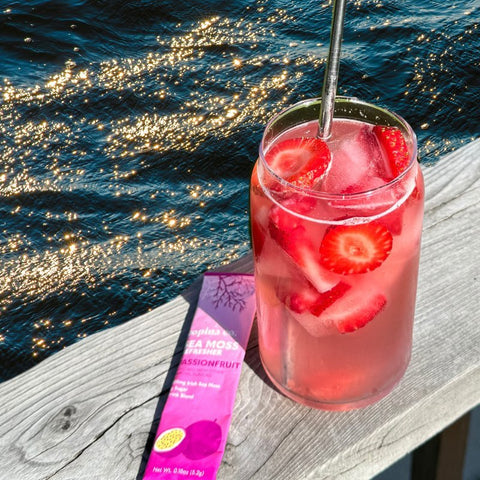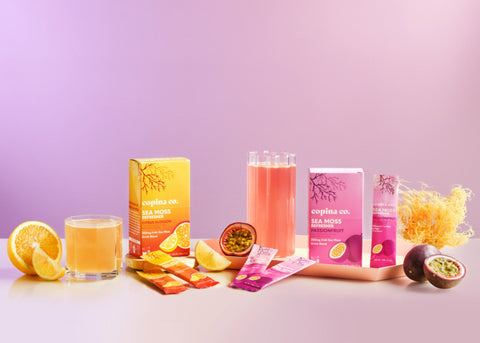Collagen production and collagen itself touch so much in our bodies. It not only is the protein that helps make our hair, skin, and nails strong and healthy- but it also aid your body in joint strenegth. Collagen is extremely important, but our body’s production of collagen decreases as we age. Seeing as our skin is our largest organ, it is important to help keep collagen production at a healthy level.
One of the best ways to help fight collagen loss is to support it with plant botanicals, but there are also lifestyle choices that make a huge difference on collagen production in the body. Below we found eight ways you can help boost your collagen production through lifestyle and diet that are easy to implement.

1. Stress
This one is a hard one because who does not experience stress on a daily level, right? The reason stress affects our skin is because when we go into a high-stress level for too long we create hormones like adrenaline and cortisol. If this is happening for a long period the hormones and stress can accelerate a loss of collagen and elastin in our body. This can also lead to your skin drying out. Collagen and elastin are what make our skin bouncy and plump.
If you want ways to help combat high-stress overdrive, because honestly, we cannot avoid stress in our daily lives, here are a few simple ways to do so.
- Set self-care goals to help rehabilitate after a stressful day
- Drink water
- Find good sleep habits
- Move your body even if it is for 10-15 minutes
- Try looking into Ashwagandha supplementing, like in our Cacao Calm Blend

Creating healthy ways to combat stress will help both your collagen production and overall health in the long run. Stress also can create inflammation in the body, but we dive deeper into that below.
2. Reduce Inflammation
Inflammation can show in our bodies in a multitude of ways. Sometimes it can look like acne, eczema, hives, rosacea, or psoriasis. Sometimes it is an allergy flare or an autoimmune condition that was triggered by food or the environment. The harsh reality that we mentioned above is that an overabundance of stress can make these forms of inflammation worse or can trigger some of the hormone releases that make acne come through. We all have been super stressed one day and the next morning find some acne on our chin, right?
The good news is that we have some ways above to help manage our stress, but also if applicable and you can afford it, it can be beneficial to look into finding a therapist to help cope with stress or anxiety. This can be especially helpful if you know the stress or anxiety might linger longer than you would like. Being able to release the stress or emotions can help manage your inflammation as well as find more tools to help you get through long bouts of stress like while grieving, hard times at work or school, or other long-term stress that is not easy to manage on our own.
Another way to help reduce inflammation through diet is to manage how often you eat too much-refined sugar or heavily processed foods. Some of these foods or sugar can cause inflammation in the body which can affect collagen production. We are not recommending you never eat sugar or processed foods, but it can be beneficial to your collagen health to not eat them in overabundance.
3. Sleep
Not getting enough sleep plays a significant role in your body’s health. This means it also affects your collagen production! If you are not getting enough sleep per night, it may affect your collagen production resulting in breaking down the barrier between the skin and mucous membranes. Sleep deprivation also lowers your body’s immune response which may affect the production of collagen.
If you find you are having trouble sleeping look into the Huberman Lab’s Toolkit for Sleep. Here you can find ways to help boost your sleep hygiene before bed that will help change your sleep health and quality.
If you are noticing you have had a few bad back-to-back nights of sleep try restoring your sleep with a few of these tips:
- Try taking a 20-minute nap or an 8-minute Navy Seal nap
- Plan to have 1 full day of rest over the weekend
- Create a sleep schedule for the rest of the week
4. Eat your protein
Now we can get into the overall areas of food that help your body naturally make collagen on its own. The way we make collagen is a process. One of those processes included breaking down amino-acids often found in protein-rich foods.
What is so special about Copina Co is we know not everyone gets their protein the same way. Here are some great ways you can get in some protein to help your collagen production through vegan sources:
- Tofu
- Lentils
- Beans
- Nutritional yeast
- Spelt and teff
- Hemp seeds
- Spirulina
- Quinoa
5. Be mindful of Zinc and Copper
These minerals play an important role in the process of creating collagen. The good news is that they are already very viable through whole grains and beans that you already are probably incorporating into your daily diet.
The reason we need to try and eat foods rich in zinc and copper is that zinc helps stimulate the body’s production of collagen while copper activates an enzyme that helps collagen strengthen and mature.
Foods rich in Zinc and Copper include:
- Nuts
- Seeds
- Chocolate
- Beans
- Wholegrains (try to get the least processed version of this)
6. Foods High in Vitamin C
Helping your collagen production can also be through foods rich in Vitamin C like citrus, bell peppers, and berries. If you are unable to get vitamin C through your food, there has also been research done showing that vitamin C supplements can also work to help with collagen production.
Some foods rich in vitamin C are:
- Cherries
- Chili peppers
- Guava
- Cantaloupe
- Parsley
- Mustard Spinach
- Kale
- Kiwi
- Broccoli
Try adding a handle of these fruits and veggies throughout the week to help boost your vitamin C intake!
7. Garlic
Garlic is an amazing ingredient to be adding to your meals if you want to help boost your collagen. Garlic contains sulfur and taurine. Sulfur is needed to help create collagen in the body but taurine helps build older collagen fibers that have been damaged.
Here are some of our amazing recipes that help add a little spice (but also garlic) into your meals:
8. Our Ingredients
We also have a special way you can increase your collagen production through our beauty blends! We have four amazing drink blends that have collagen-boosting ingredients.
Our collagen boosters include:
- Amla Berry
- Tremella Mushroom
- Bamboo Leaf Extract
- Biotin
- Gotu Kola
- Hyaluronic Acid
If you want to learn more about each ingredient and how it can help you with your #CopinaCoGlow take a look at our Ultimate Guide to our Ingredients blog post. We dive deeper into each ingredient including our formula that has Matcha and our Cacao Calm blend that has Ashwagandha!













